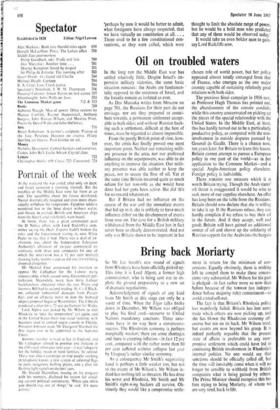Bring back Moriarty
So Mr Ian Smith's new round of signals from Rhodesia have been officially picked up. This time it is Lord Alport, a former high commissioner, who is being sent out to ex- plore the ground preparatory to a new set of dramatic negotiations.
Acknowledgment of signals of any kind from Mr Smith at this stage can only be a waste of time. When the Tiger talks broke down in December, Mr Wilson was obliged to play his final card—recourse to United Nations mandatory sanctions. These sanc- tions have in no way been a conspicuous success. The Rhodesian economy is perhaps marginally weaker: there are some shortages and there is creeping inflation—in fact 12 per cent, compared with the rather more than 80 per cent suffered without collapse last year by Uruguay's rather similar economy.
As a consequence Mr Smith's negotiating hand is perhaps a little weaker too, but not to the extent of Mr Wilson's, Mr Wilson in- deed has nothing left to threaten. He has done his worst and Rhodesia, Mr Smith and Mr Smith's right-wing backers all survive. Ob- viously they would like a compromise settle- ment in return for the minimum of con- cessions. Equally obviously, there is nothing left to compel them to make these conces- sions very substantial. Mr Wilson for his part is pledged—in fact rather more so now than before because of the NIBMAR (no indepen- dence before majority rule) commitment—to avoid a total sell-out.
The fact is that Britain's Rhodesia policy has manifestly failed. Britain has lost some trade which others are now picking up, and she has blown the Rhodesian economy off- course but not on its back. Mr Wilson tried, but events are now beyond his grasp. It is indeed perfectly arguable that the present state of affairs is preferable to any com- promise settlement which could have led to continuing British involvement in Rhodesia's internal politics. No one would say that sanctions should be officially called off, but the time will inevitably come when it will no longer be sensible to withhold from British companies what is being gained by others. The Prime Minister should recognise this be- fore trying to bring Moriarty, of whom we are very tired, back to life.


































 Previous page
Previous page